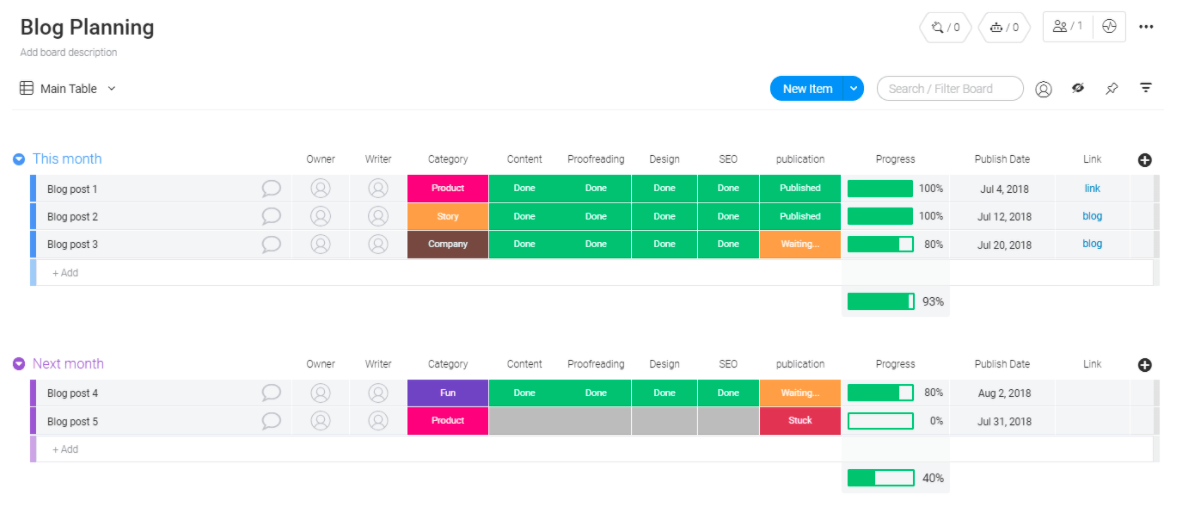Marketing is the foundation of how you communicate your value to potential customers and convert them.
Developing an overarching marketing strategy is all about understanding who your customers are, how your product fits into the market, and where to reach the right people.
The trick to building a successful marketing strategy is choosing the right one for your needs, and getting it down on (proverbial) paper. In fact, marketers with documented strategies are a whopping 313% more likely to be successful!
We’ll walk you through what a marketing strategy is, how to build a marketing plan based on that strategy, and how to oversee day-to-day plans and execution seamlessly.
What is a marketing strategy?
A marketing strategy is your business’s game plan for finding your target audience — those people who are your potential customers — and turning them into such.
A marketing strategy should also support your business’s value proposition and communicate why you’re the better choice over your competitors.
It’s critical to get organized when it comes to your marketing strategy.
In fact, organized marketers are 397% more likely to report success, and goal-setting marketers are 376% more likely to report success — both practices are a natural part of building a marketing strategy.
One of the most critical parts of building a marketing strategy is documenting it and tracking its success, both of which can be done using monday.com’s Work operating system (OS).
Our marketing strategy template allows marketing leaders to easily keep track of campaigns by department or goal — including important elements like the project brief, status, priority, and timeline.

This template can be adapted to keep track of projects by goal, or narrowed further to keep track of specific asset optimization.

Finally, there are placeholder columns to help marketing leaders keep an eye on deadlines and target goals.
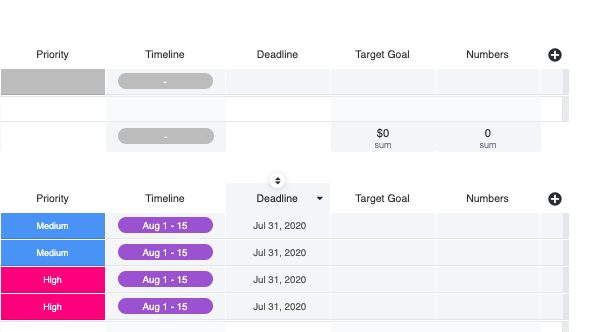
But before you dive into actually documenting your marketing strategy, you might want to perform a marketing SWOT analysis. A SWOT analysis helps you think about your business in terms of its strengths, weaknesses, opportunities, and threats.
Marketing leaders can use monday.com’s Work OS to document potential projects, goals, and needs in our marketing SWOT analysis template.
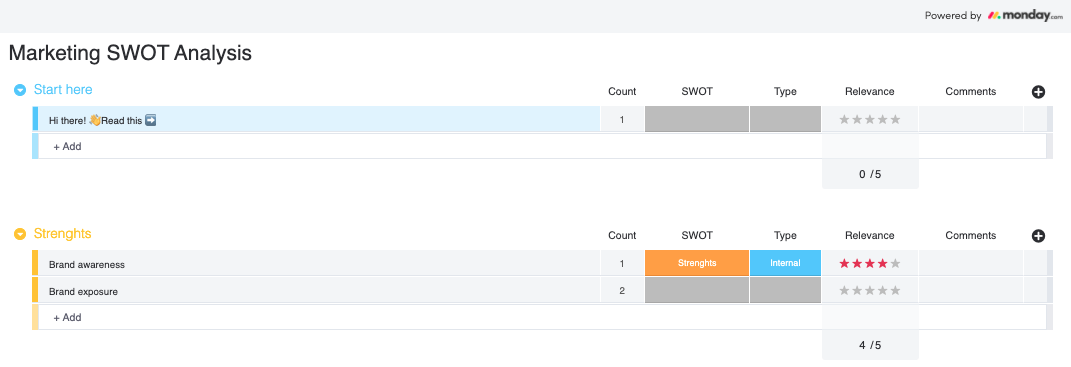
This template organizes groups of tasks by the four pillars of a SWOT analysis and ranks tasks or goals in terms of relevance and priority.
Marketing strategy vs. marketing plan
It’s important to note that a marketing strategy is not the same thing as a marketing plan.
A marketing strategy defines your purpose, product offering, and strategic goals in support of your company’s mission — it tells the story of where you want to go as a company. Whereas your marketing plan is a roadmap of tactical efforts to get you there.You might have one overarching strategy, and then sub-strategies for different areas of marketing — as we’ll see in a minute.
Similarly, you might have one overarching plan, bringing together all the steps that need to happen to achieve every strategy, or you might have a separate plan under each sub-strategy.
How you build it out is up to you.
Of course, using monday.com you can create a separate strategy and plan for each marketing area and link them all together, so you also have a cohesive overall strategy and plan.
But the important point to remember here is that strategy = what, and plan = how.
A marketing plan is often tracked and documented using a marketing calendar. These are most often organized by month, and include plans for campaigns, distribution, status, and due date.
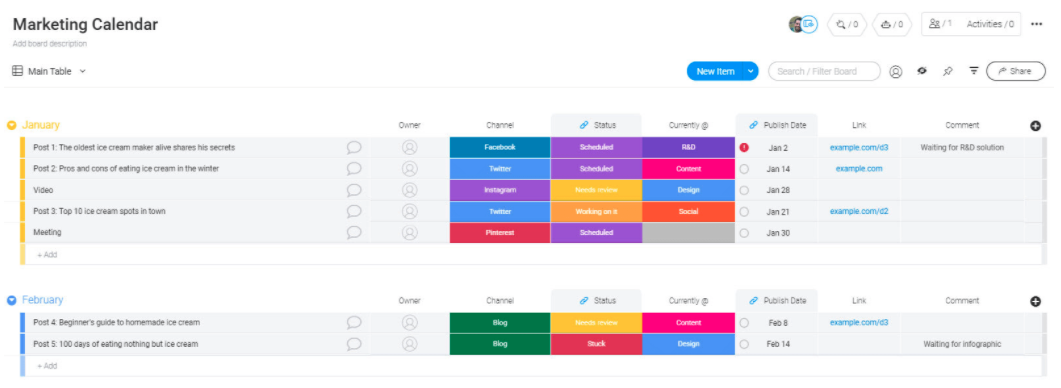
monday.com’s Work OS is a super useful marketing management tool that makes it possible to view your marketing calendar in both list and table format as well as using an actual calendar, as shown below:
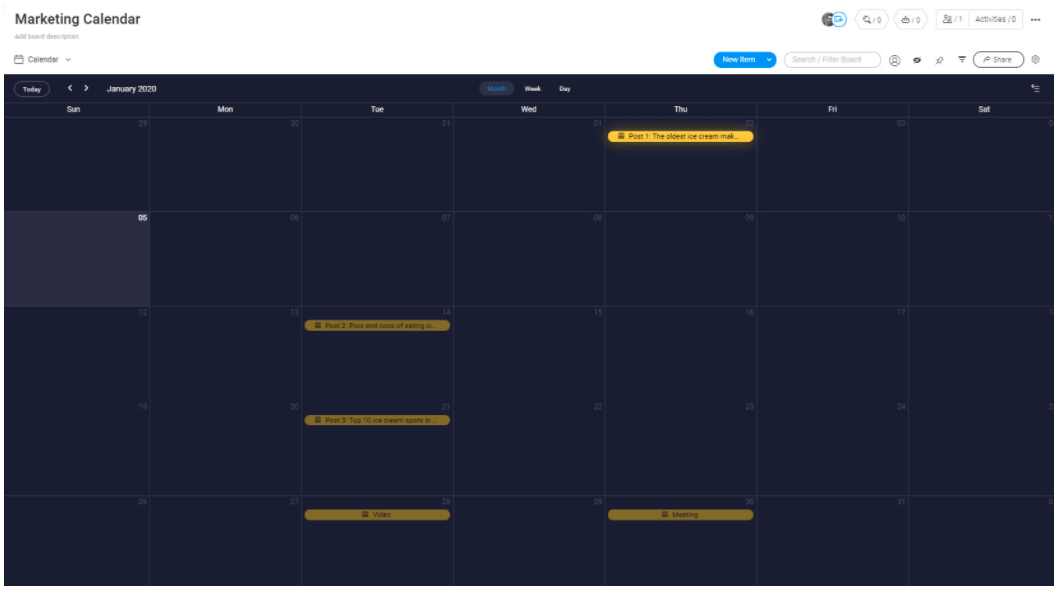
Of course, you can’t execute a marketing plan without a budget. In order to track your marketing budget, use a template that allows you to estimate planned spend, record actual spend, and keep track of things like campaign status and media type.

What are the most effective marketing strategies?
After defining your overall marketing strategy, performing a SWOT analysis and setting up an overall marketing plan and budget, let’s dive into the various marketing strategies that you can use in support of your goals.
Digital marketing strategy
A digital marketing strategy encompasses all digital marketing platforms, including pay-per-click (PPC), search engine optimization (SEO), paid and organic social media, email, blog posts, web pages, and so much more. Pay-per-click is a marketing method that brings instant results, whereas SEO is usually a long-term project.
It’s often a catch-all for everything your business does online in support of marketing efforts, and excludes activities like in-person events, print sales materials, company swag, and out-of-home media buys like billboards and other ad types.
Including interactive content such as flipbooks, polls, quizzes and AR advertisements in your digital marketing strategy is also important as it keeps people on your website for longer and improves their experience.
To accurately plan and execute a digital marketing plan in support of your strategy, you’ll need to track the status of various campaigns, platforms used for execution, and various stakeholders.
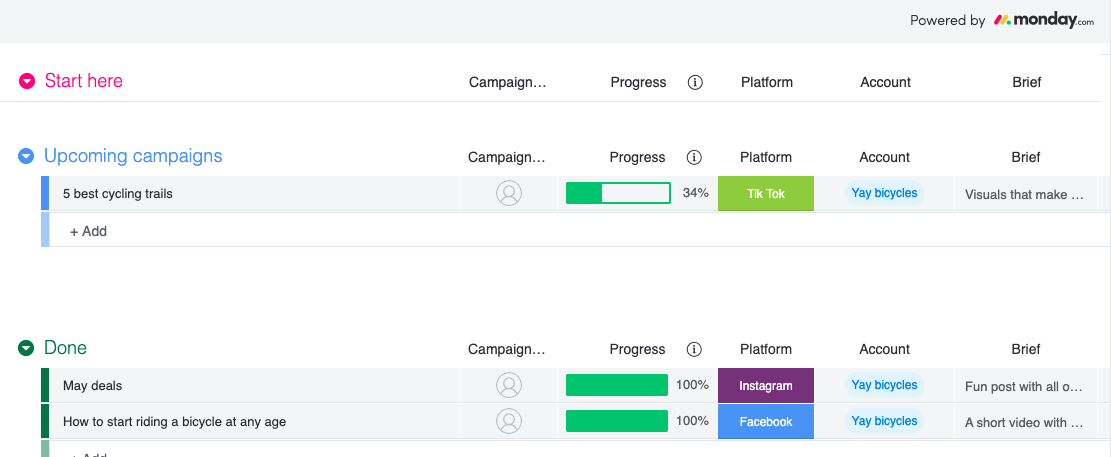
From there, tracking allocated spend versus actual spend, target audience, and path to content creation in support of the campaign are crucial for an on-time and impactful launch.
To keep track of campaign performance, link your digital marketing strategy to a campaign tracking dashboard to easily view details like performance by platform and campaign duration.
![]()
If your campaigns aren’t organized by channel, try this marketing campaign template, which provides a broader overview of campaign success for marketers who might need it.
Content marketing strategy
A content marketing strategy is closely associated with inbound marketing, and is the process of building high-quality assets (pieces of content) for relevant target audiences, in order to move them down the funnel to purchase.
Content calendars are the core of a content marketing strategy, assisting marketers in planning, executing, and publishing various types of content to support this goal.
A content calendar is typically organized by month, and includes the status, stakeholders, audiences, and final publish link of each asset — as well as anything else your organization might need to track.
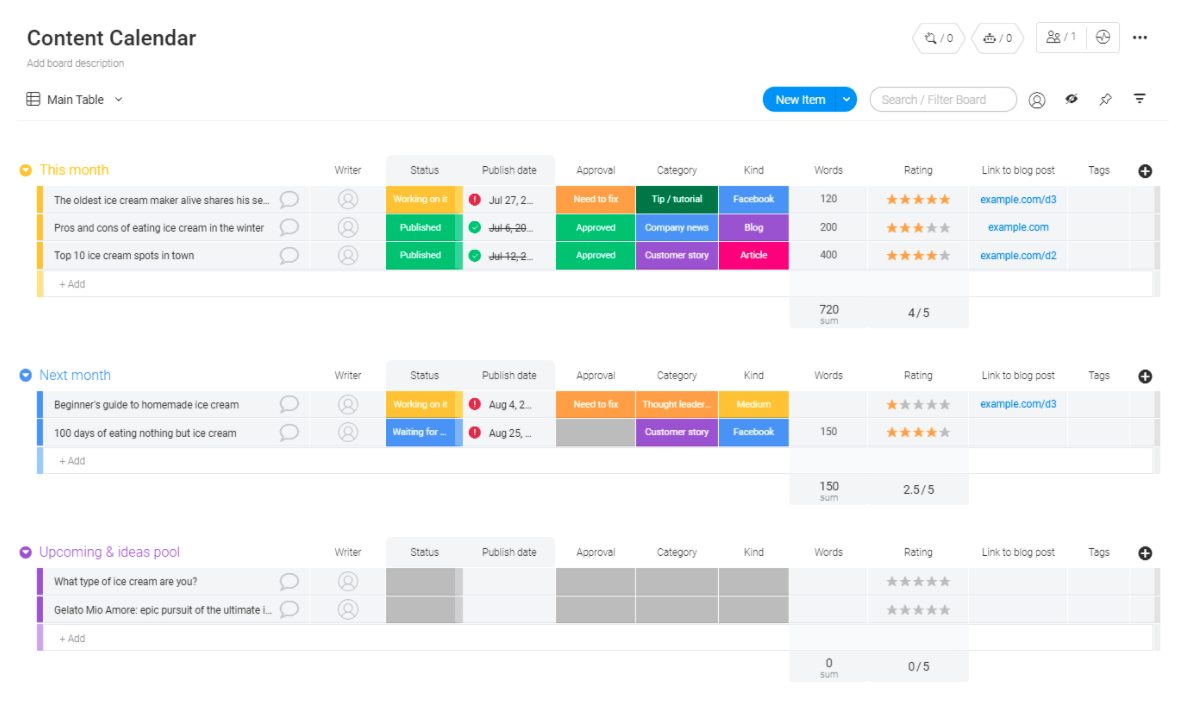
The terms content calendar and editorial calendar are often used interchangeably, but they’re not exactly the same.
A content calendar might include things like product webpages and sales one-sheets, whereas an editorial calendar typically focuses on things like blog articles, videos, bylines, and more.
Blogging strategy
Part of your content marketing strategy is likely going to be running a blog. Execute your blog plans with a tracking template that captures content type, category, stage of creation, publish date, and more. Make sure that your blog content follows best practices, i.e. it is well-structured, delivers a great user experience, and answers user intent.
If search engine optimization (SEO) is a core part of your blogging strategy, our template is set up to make sure you’ve tracked whether or not your assets hit your SEO goals before they go live.
Video strategy
Content marketing strategies almost always include brand awareness and video these days. In order to track and manage the creation and distribution of video content, adapt this content planning template to include steps like storyboarding, production, editing, and more.
Organize your plans by date, or perhaps by channels — YouTube, Vimeo, Instagram (posts, reels, and stories), TikTok, Facebook, and LinkedIn are often popular channels through which marketers distribute video content.
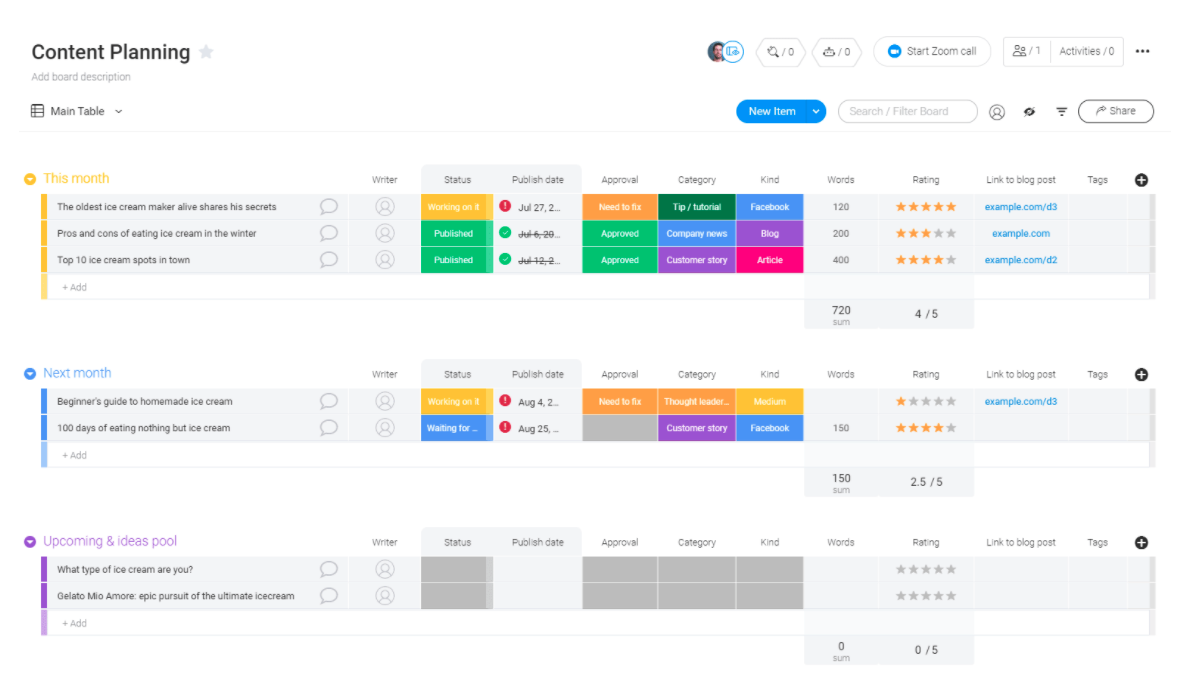
Audio strategy
These days, your content strategy isn’t complete without an audio content or podcast strategy. Our podcast planning template allows you to track audio content creation, production, and distribution all in one place.
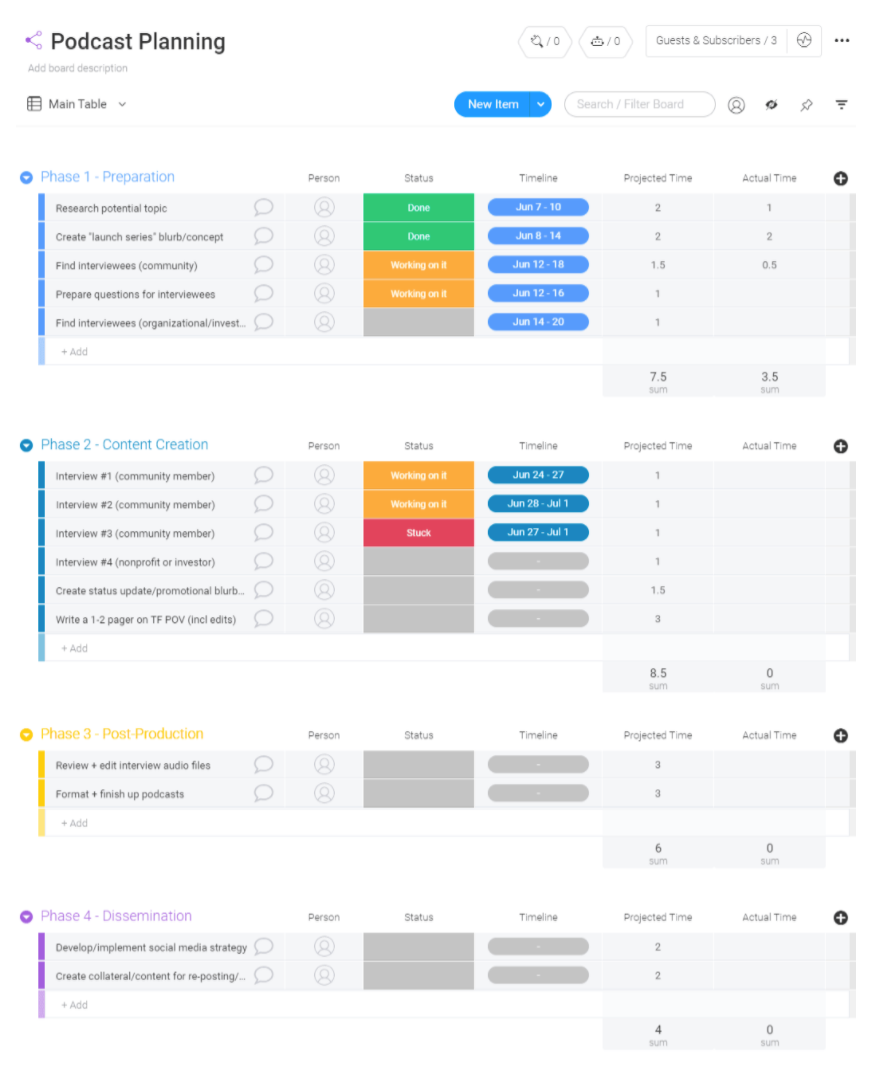
Social media marketing strategy
A social media marketing strategy is your business’s plan to leverage specific social media channels to meet your needs.
Your social media strategy can sometimes overlap with your digital marketing strategy if you choose to plan both paid and organic social media efforts under one roof.
Much like a content calendar, marketers often rely on a social media calendar to keep operations running and track the success of various campaigns.
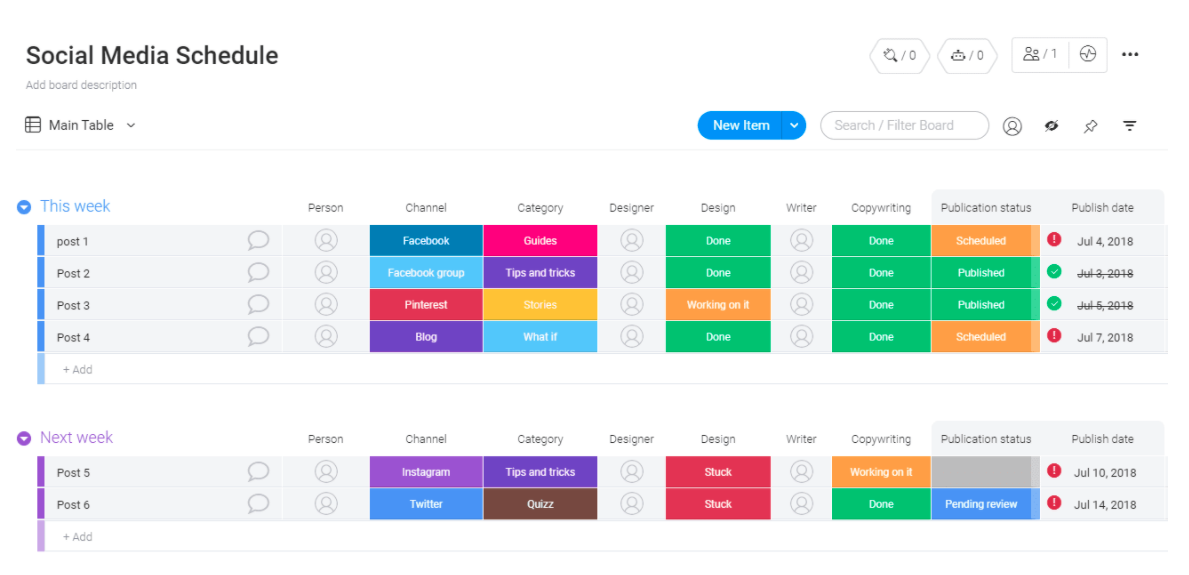
Outside of producing social media content and getting it live, you’ll also want to make sure you’re crystal clear on which efforts have been successful and which have not.
monday.com’s social media metrics template allows marketers to track campaigns by impressions, engagement, link clicks, and other metrics that matter to them.
![]()
Product marketing strategy
A product marketing strategy is the bridge between your product team and your marketing team, and includes the management of a go-to-market strategy plan for new products or features on your product roadmap.
Product roadmaps are often used to help business functions like marketing and sales plan for new feature launches and create supporting assets like sales decks, one-sheets, talking points for account managers and sales representatives, and much more.
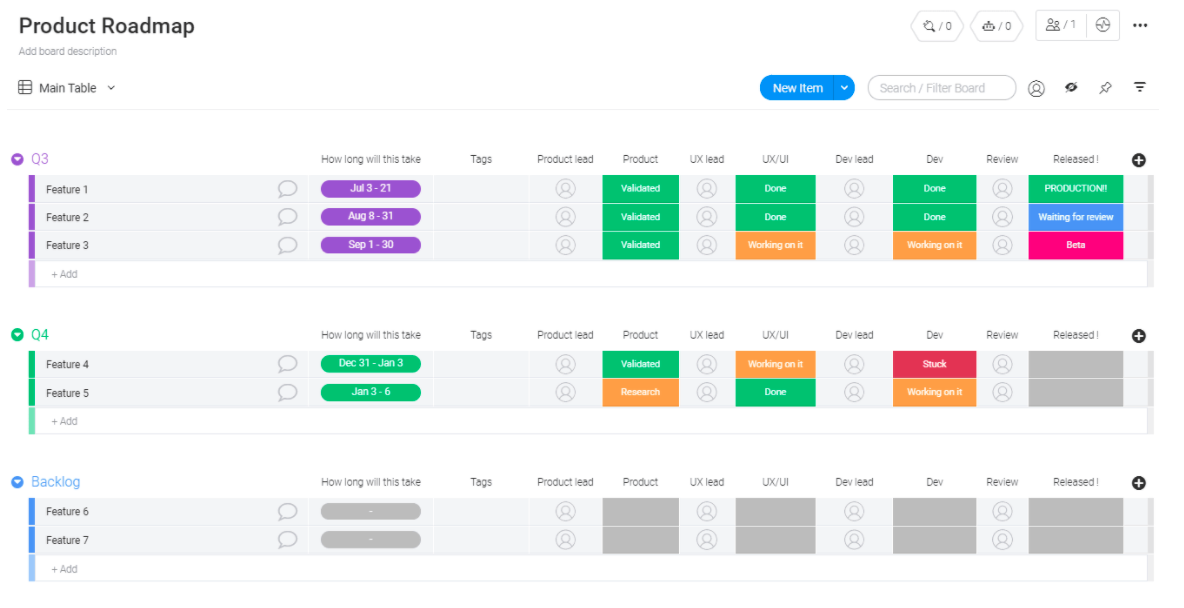
Email marketing strategy
An email marketing strategy includes everything that’s communicated via email from your business to your customers or prospects — including marketing messages, product updates, sales outreach, and more. Think of your email marketing strategy as the blueprint for targeting the right audience and the best route to speak directly to them.
Email marketing is often fragmented in the sense that ownership spans multiple different teams within marketing. It’s important to keep track of one master email marketing calendar, so you don’t lose sight of the overall customer experience, or worse, end up spamming your customers.
monday.com’s email marketing template allows teams to organize email communications by category, send date, audience, status, and much more.
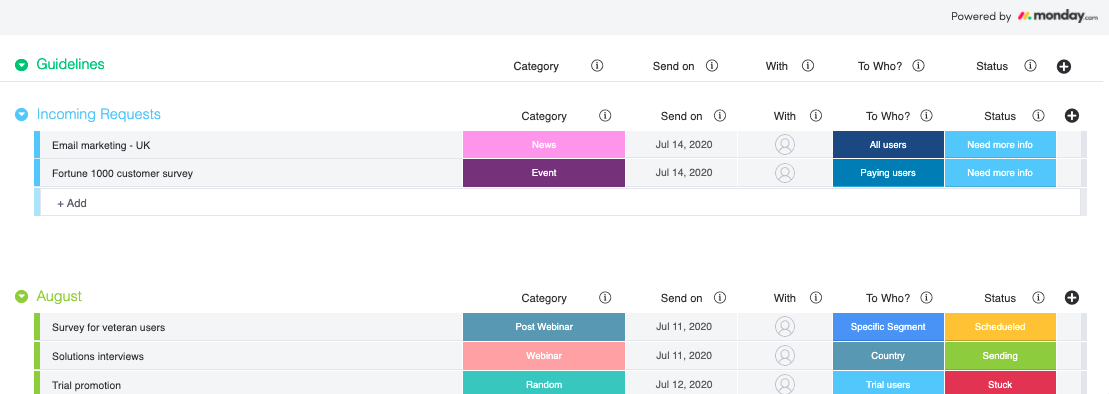
Our template can be expanded to include important email metrics like open rate, click-through-rate, and website traffic, so you can determine which marketing efforts have been successful and which have not.
Event marketing strategy
An event marketing strategy includes the attendance or sponsorship of both online and offline events — conferences, webinars, trade shows, client dinners (if relevant), and more.
Event planning is easily planned and executed with monday.com’s event schedule template, which allows marketers to view task lists alongside a calendar. Marketing teams can assign event leads, assistants, status, dates, timelines, and more.
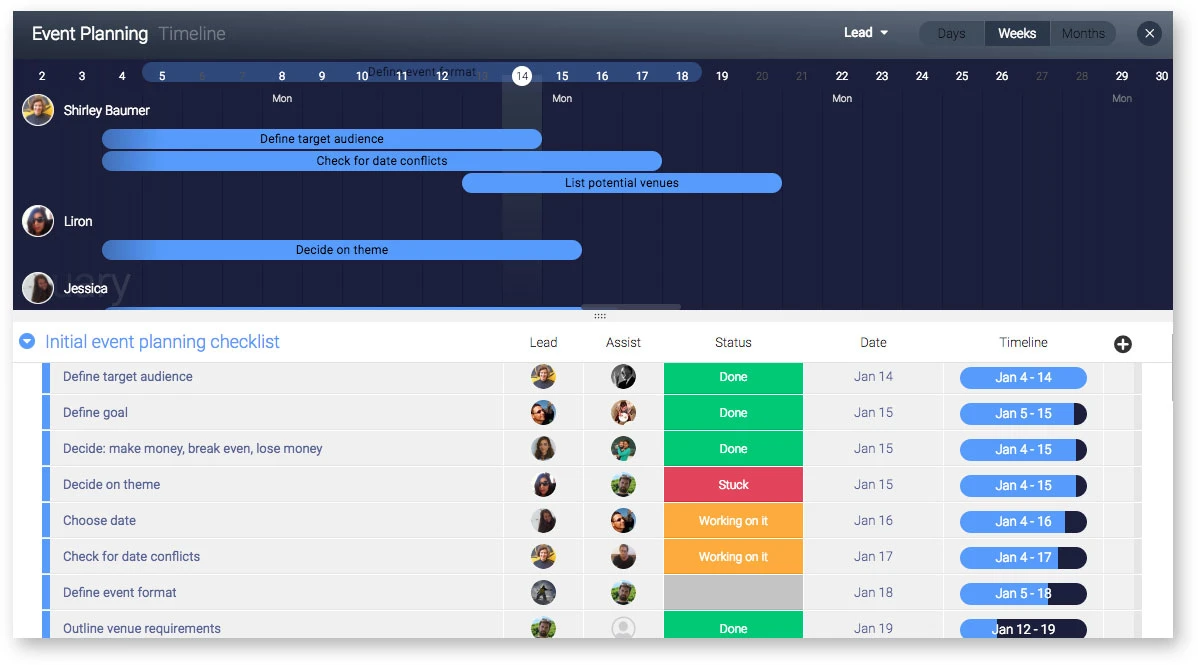
PR strategy
A public relations (PR) strategy is an organized effort to target media outlets — including online, print and broadcast — for the purpose of reaching a broad audience and influencing brand perception and sales.
It can often be complex. Relationships need to be built not just with customers, but with journalists, government decision-makers, and other influential entities and institutions.
In support of your PR strategy, monday.com has an easy to use media coverage template that supports PR teams in tracking various types of coverage.
![]()
SEO strategy
Last, but certainly not least, an SEO strategy is one of the most important traffic drivers for any website or business.
This encompasses the creation of content that ranks for certain keywords through organic search engines, so that relevant consumers find your website and products.
The foundation of any SEO strategy is keyword research — which is the process of identifying relevant search queries in search engines like Google and Bing — and developing a plan for a web page or series of web pages to rank for those keywords. Check out this local SEO guide to learn more in-depth about the importance of keyword research!
monday.com’s keyword research template allows marketers to collect and analyze data across various long-tail keywords and clusters, and then build those content plans into a content calendar.
Your keyword research will include documentation and analysis of things like difficulty, search volume, average cost per click (CPC) if using paid advertisements, and landing pages which you plan to utilize in support of your efforts.
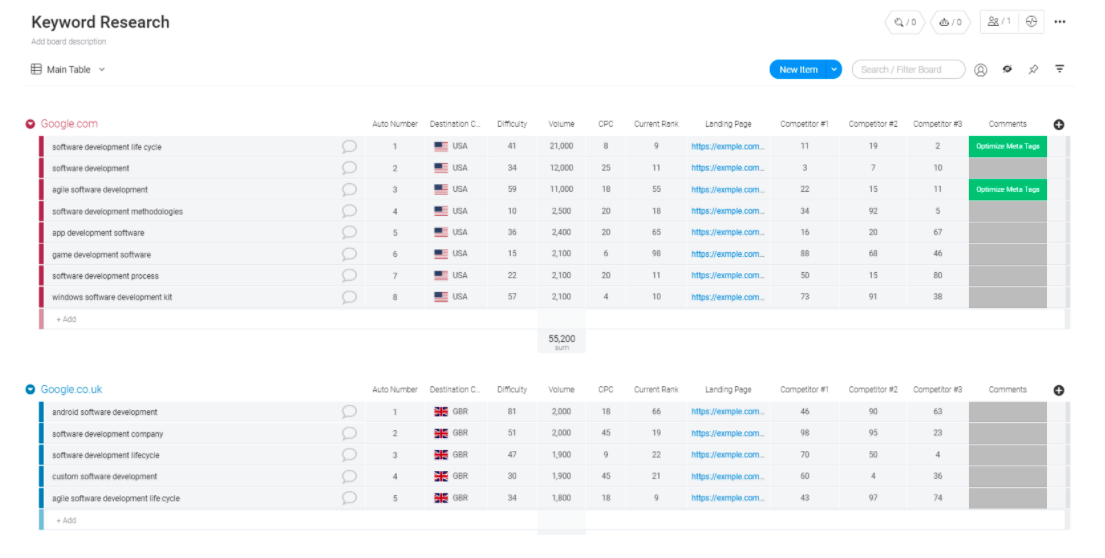
Optimize your marketing tactics with the right tools
All marketing strategies need to be integrated with one another, and are often dependent on the successes and failures of one another.
For example, a blog post might not be successful without a social media or email campaign to distribute it. Or a PR campaign might not be successful without attending a flagship event where your team can meet multiple reporters at once.
For the best chance of success, you’ll want to build your marketing strategy on a Work OS that acts as everything you need all in one — a project management tool, performance tracker, communications tool, file storage system, and so much more.
monday.com has everything marketing teams need to execute their marketing strategies. Get started today.
 Get started
Get started 

